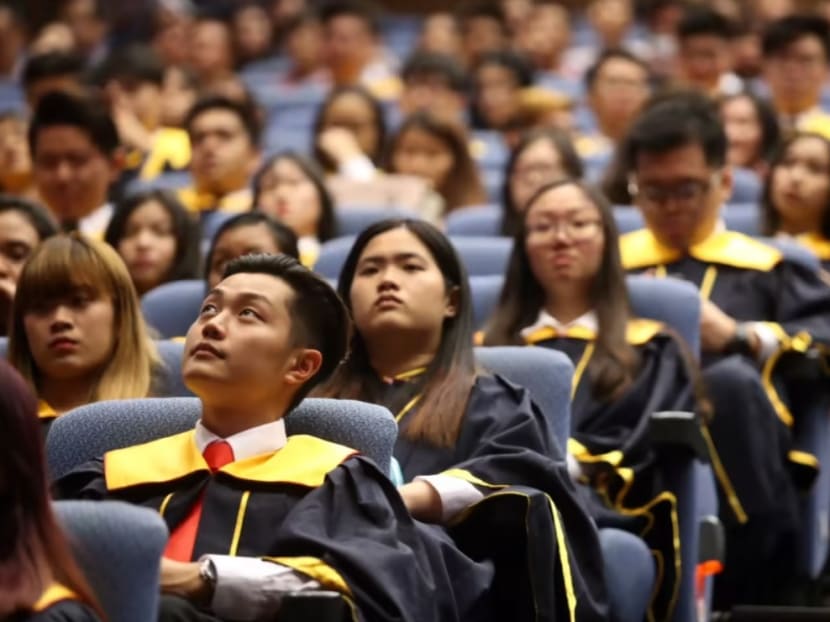Starting pay of university and non-university graduates: Gap widens by up to S$300 from 2016 to 2021
SINGAPORE — Although starting salaries have risen for all graduates, the gap between university and non-university graduates' starting pay continues to widen.

Polytechnic students at a graduation ceremony.
- The starting salary gap between university and non-university graduates continues to widen
- Between 2016 and 2021, the gap between university and polytechnic graduates increased by S$200; and by S$300 between university and ITE graduates
- Education Minister Chan Chun Sing said the difference in wages is due to various factors, such as demand and supply of manpower in different jobs and sectors
- He called on companies and employers to commit to hiring, training and rewarding workers based on their skills and competencies, rather than their starting qualifications
SINGAPORE — Although starting salaries have risen for all groups of graduates in Singapore, the gap between university and non-university graduates' starting pay continues to widen.
Between 2016 and 2021, the median starting salary gap between university and polytechnic graduates increased by S$200.
The gap between university and Institute of Technical Education (ITE) graduates grew even wider, increasing by S$300 during the same time period.
These numbers based on data from the Graduate Employment Surveys were revealed by Education Minister Chan Chun Sing in a written response to a parliamentary question by Mr Edward Chia Bing Hui, Member of Parliament for Holland-Bukit Timah Group Representative Constituency.
Mr Chia had asked what is the reason for the widening salary gap between university and non-university graduates, and what are the Ministry of Education's plans to address this.
Last month, Deputy Prime Minister and Finance Minister Lawrence Wong said that the median starting salary for university graduates is about twice that of ITE graduates and about 1.5 times that of polytechnic graduates.
"While some difference is understandable, too wide a gap can lead to problematic outcomes," Mr Wong said at a conference by the Institute of Policy Studies.
“It also becomes harder to match the right persons with the right skills to the right jobs. And all this compounds the sense of a continuous rat race and paper chase, adding to the worries and anxieties of Singaporeans,” he added.
A study published last year by the National University of Singapore (NUS) found that Singaporeans with a university degree or post-graduate degree earn a median salary of S$4,200 a month, more than double the S$2,000 median monthly salary earned by those with an ITE qualification.
However, the study led by Associate Professor Irene Ng from NUS’ social work department focused on the salaries of Singaporeans in their 20s and 30s, rather than their starting pay.
In his written response, Mr Chan said that the difference in graduates' salaries is a result of various factors.
This includes the relative demand and supply of manpower, and differences in productivity between the different jobs and sectors that graduates enter.
One example he cited was the information and community technology sector, which has seen increased wages due to digitalisation and Covid-19 accelerating demand for manpower. This has in turn attracted a growing proportion of degree holders.
"While some differences are understandable, it is important that we ensure these differences do not widen significantly over individuals’ lifetimes," Mr Chan said.
"Singaporeans must feel that there are opportunities to progress over their career regardless of differences in starting points."
Detailing MOE's plans to shrink the starting salary gap, Mr Chan said that the ministry and other government agencies work with educational institutions and industry partners to encourage companies to recognise the skills and competencies of non-university graduates.
For example, the Infocomm Media Development Authority set up a technical skills accelerator alliance for ITEs and polytechnics last year that comprised global and Singapore companies.
This is to drive the shift in hiring practices in the tech industry from one that is qualification-based to skills-based. It is also to help equip students and graduates from ITEs and polytechnics with the skills to take up tech job opportunities and be part of Singapore’s digital growth.
Companies that have joined the alliance include DBS bank, Dell Technologies, Google, IBM, Singtel and ST Engineering.
Similarly, the Ministry of Trade and Industry has introduced a grant to support manufacturing companies in hiring and training ITE graduates for critical technician and assistant engineer roles, and providing them with skills progression and competitive salaries.
Mr Chan called on companies and employers to raise productivity and commit to hiring, training and rewarding workers based on their skills and competencies, rather than their starting qualifications.











